Intellectual Property Law: Analysis of Internet Blocking Injunctions
VerifiedAdded on 2020/05/28
|14
|3292
|228
Report
AI Summary
This report provides a comprehensive overview of Intellectual Property Law, with a specific focus on European Trademark Law and the evolving landscape of internet blocking injunctions. It begins with an introduction to the challenges posed by the internet to intellectual property rights, particularly trademark counterfeiting and piracy. The report then delves into the specifics of European Trademark Law, including the Trademark Directive, the Community-wide trademark right (CTM), and the protection offered under Articles 5.1(a), 5.1(b), and 5.2. It examines the role of intermediaries, such as Internet Service Providers (ISPs), in enforcing these rights through internet blocking injunctions. The report analyzes key cases, including UPC Telekabel Wien v Constantin (CJEU) and Cartier International AG and others v British Sky Broadcasting Limited (UK), discussing the legal frameworks, proportionality, and the balance between IPR holders' rights, intermediaries' operations, and users' freedom of information. It also highlights the challenges in harmonizing and adapting to the rapidly changing digital environment and the courts' role in striking a balance between various interests.
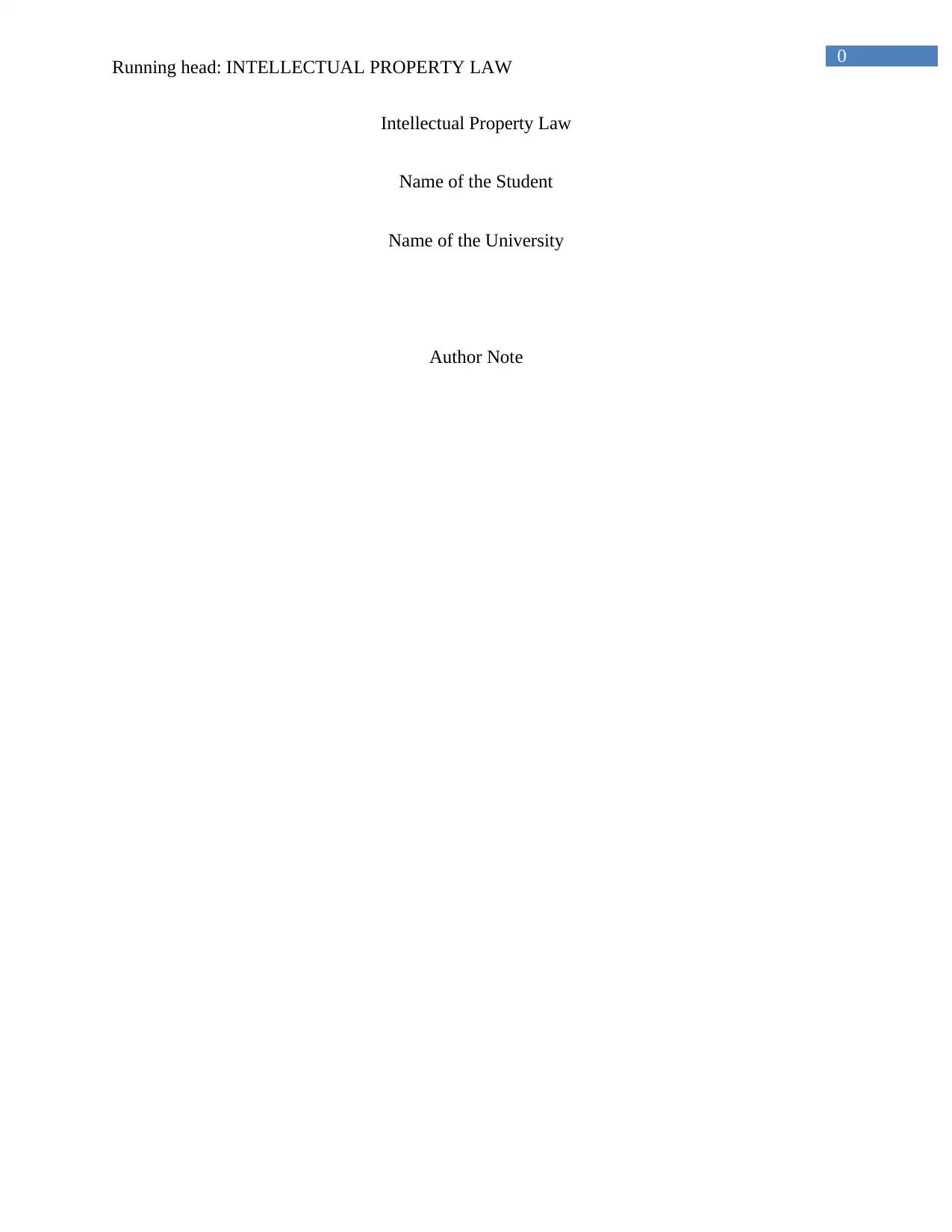
0
Running head: INTELLECTUAL PROPERTY LAW
Intellectual Property Law
Name of the Student
Name of the University
Author Note
Running head: INTELLECTUAL PROPERTY LAW
Intellectual Property Law
Name of the Student
Name of the University
Author Note
Paraphrase This Document
Need a fresh take? Get an instant paraphrase of this document with our AI Paraphraser
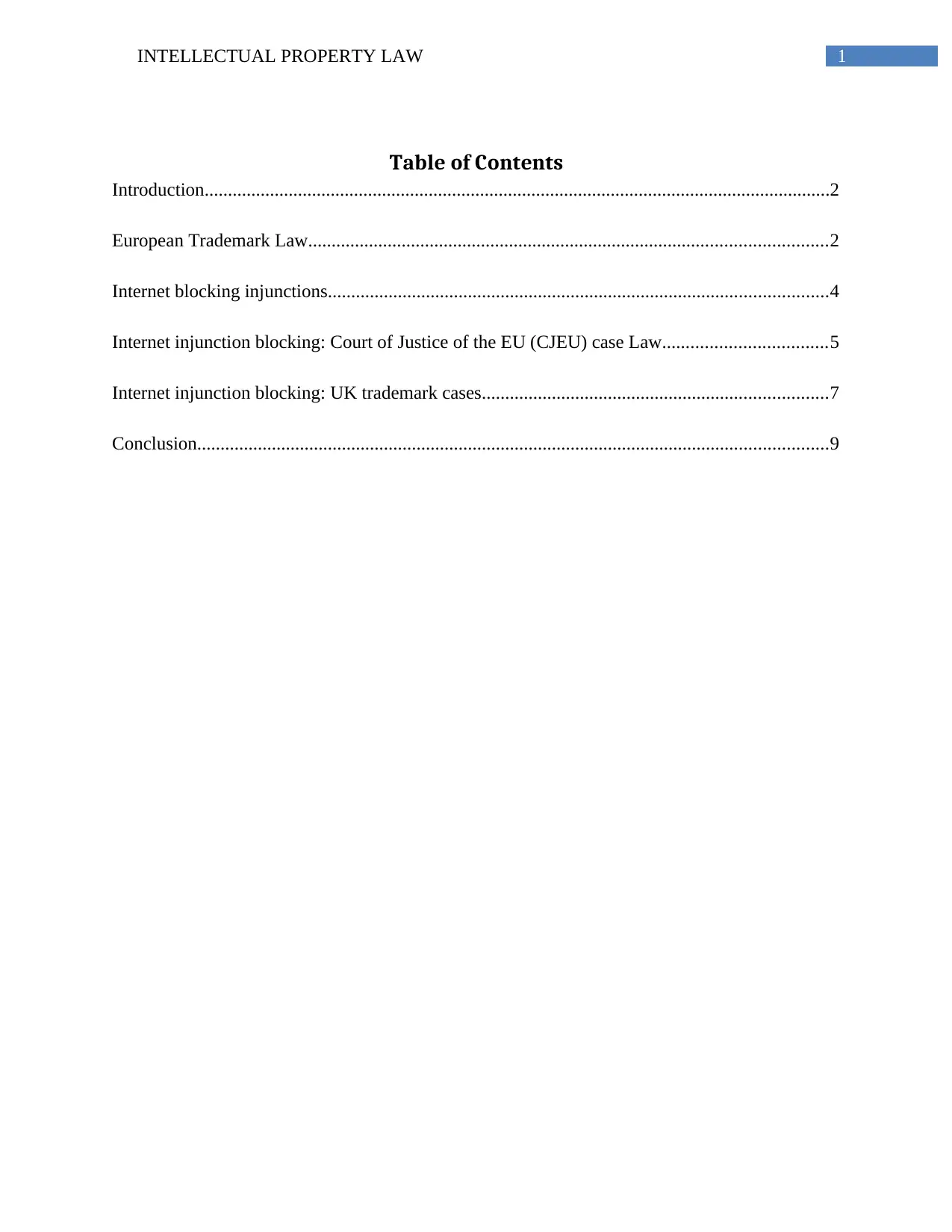
1INTELLECTUAL PROPERTY LAW
Table of Contents
Introduction......................................................................................................................................2
European Trademark Law...............................................................................................................2
Internet blocking injunctions...........................................................................................................4
Internet injunction blocking: Court of Justice of the EU (CJEU) case Law...................................5
Internet injunction blocking: UK trademark cases..........................................................................7
Conclusion.......................................................................................................................................9
Table of Contents
Introduction......................................................................................................................................2
European Trademark Law...............................................................................................................2
Internet blocking injunctions...........................................................................................................4
Internet injunction blocking: Court of Justice of the EU (CJEU) case Law...................................5
Internet injunction blocking: UK trademark cases..........................................................................7
Conclusion.......................................................................................................................................9
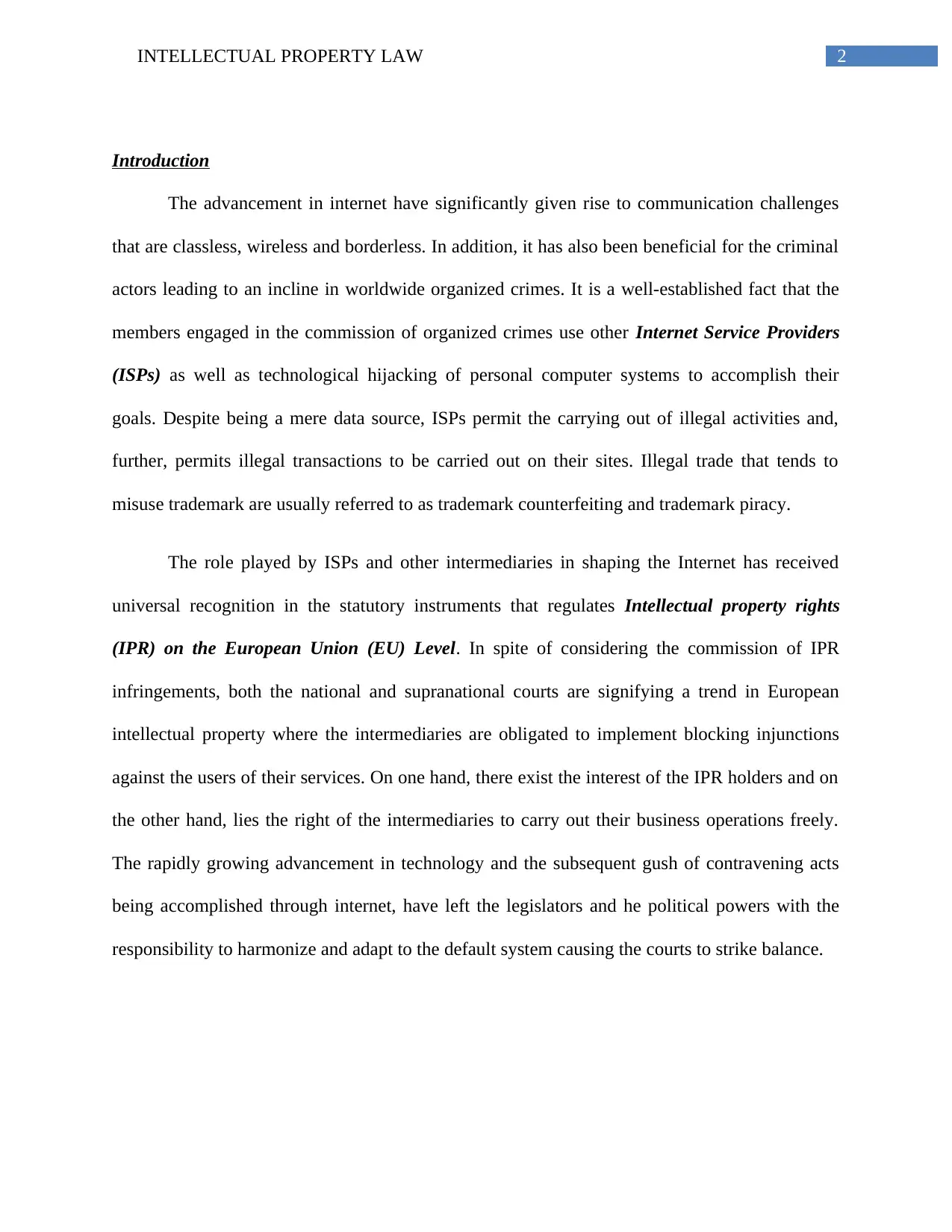
2INTELLECTUAL PROPERTY LAW
Introduction
The advancement in internet have significantly given rise to communication challenges
that are classless, wireless and borderless. In addition, it has also been beneficial for the criminal
actors leading to an incline in worldwide organized crimes. It is a well-established fact that the
members engaged in the commission of organized crimes use other Internet Service Providers
(ISPs) as well as technological hijacking of personal computer systems to accomplish their
goals. Despite being a mere data source, ISPs permit the carrying out of illegal activities and,
further, permits illegal transactions to be carried out on their sites. Illegal trade that tends to
misuse trademark are usually referred to as trademark counterfeiting and trademark piracy.
The role played by ISPs and other intermediaries in shaping the Internet has received
universal recognition in the statutory instruments that regulates Intellectual property rights
(IPR) on the European Union (EU) Level. In spite of considering the commission of IPR
infringements, both the national and supranational courts are signifying a trend in European
intellectual property where the intermediaries are obligated to implement blocking injunctions
against the users of their services. On one hand, there exist the interest of the IPR holders and on
the other hand, lies the right of the intermediaries to carry out their business operations freely.
The rapidly growing advancement in technology and the subsequent gush of contravening acts
being accomplished through internet, have left the legislators and he political powers with the
responsibility to harmonize and adapt to the default system causing the courts to strike balance.
Introduction
The advancement in internet have significantly given rise to communication challenges
that are classless, wireless and borderless. In addition, it has also been beneficial for the criminal
actors leading to an incline in worldwide organized crimes. It is a well-established fact that the
members engaged in the commission of organized crimes use other Internet Service Providers
(ISPs) as well as technological hijacking of personal computer systems to accomplish their
goals. Despite being a mere data source, ISPs permit the carrying out of illegal activities and,
further, permits illegal transactions to be carried out on their sites. Illegal trade that tends to
misuse trademark are usually referred to as trademark counterfeiting and trademark piracy.
The role played by ISPs and other intermediaries in shaping the Internet has received
universal recognition in the statutory instruments that regulates Intellectual property rights
(IPR) on the European Union (EU) Level. In spite of considering the commission of IPR
infringements, both the national and supranational courts are signifying a trend in European
intellectual property where the intermediaries are obligated to implement blocking injunctions
against the users of their services. On one hand, there exist the interest of the IPR holders and on
the other hand, lies the right of the intermediaries to carry out their business operations freely.
The rapidly growing advancement in technology and the subsequent gush of contravening acts
being accomplished through internet, have left the legislators and he political powers with the
responsibility to harmonize and adapt to the default system causing the courts to strike balance.
⊘ This is a preview!⊘
Do you want full access?
Subscribe today to unlock all pages.

Trusted by 1+ million students worldwide
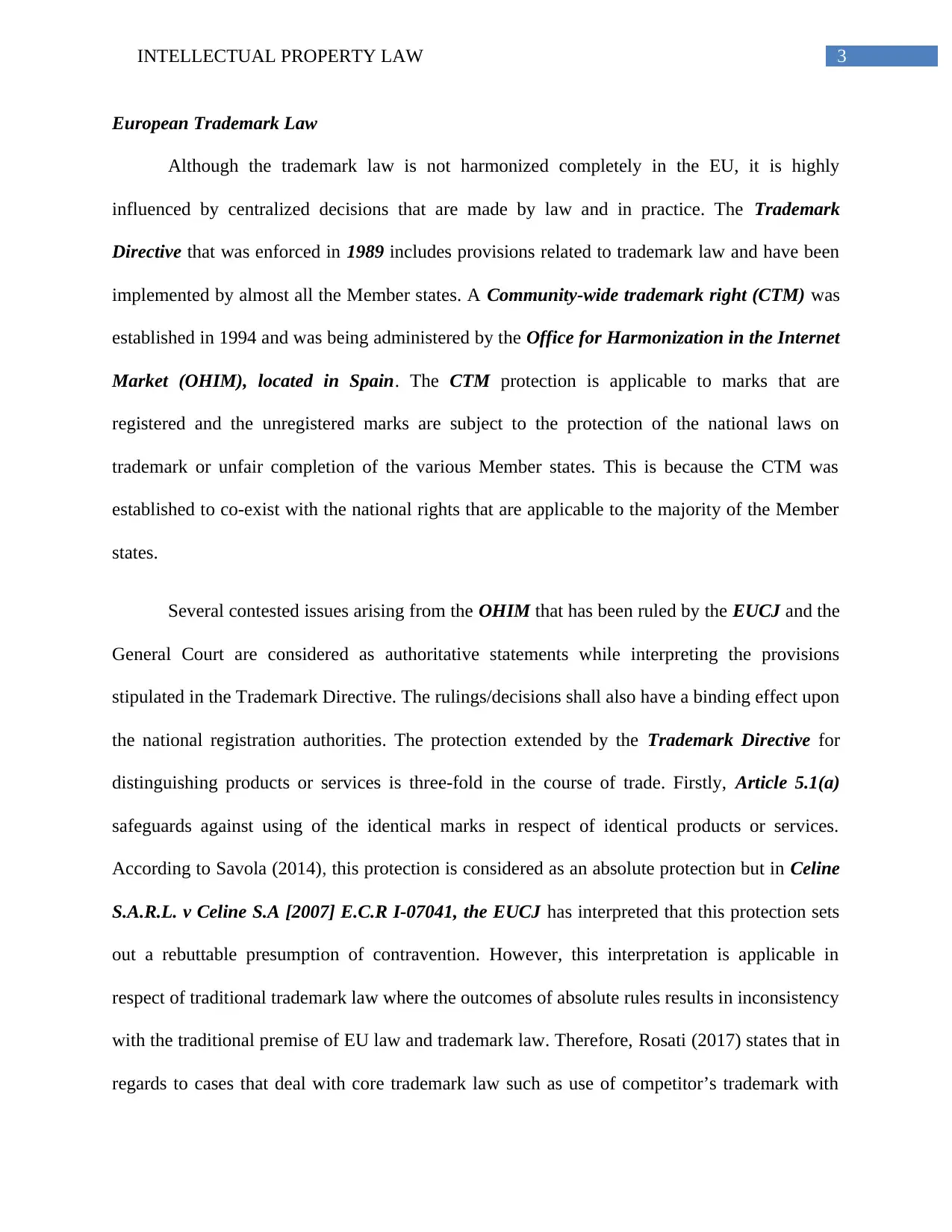
3INTELLECTUAL PROPERTY LAW
European Trademark Law
Although the trademark law is not harmonized completely in the EU, it is highly
influenced by centralized decisions that are made by law and in practice. The Trademark
Directive that was enforced in 1989 includes provisions related to trademark law and have been
implemented by almost all the Member states. A Community-wide trademark right (CTM) was
established in 1994 and was being administered by the Office for Harmonization in the Internet
Market (OHIM), located in Spain. The CTM protection is applicable to marks that are
registered and the unregistered marks are subject to the protection of the national laws on
trademark or unfair completion of the various Member states. This is because the CTM was
established to co-exist with the national rights that are applicable to the majority of the Member
states.
Several contested issues arising from the OHIM that has been ruled by the EUCJ and the
General Court are considered as authoritative statements while interpreting the provisions
stipulated in the Trademark Directive. The rulings/decisions shall also have a binding effect upon
the national registration authorities. The protection extended by the Trademark Directive for
distinguishing products or services is three-fold in the course of trade. Firstly, Article 5.1(a)
safeguards against using of the identical marks in respect of identical products or services.
According to Savola (2014), this protection is considered as an absolute protection but in Celine
S.A.R.L. v Celine S.A [2007] E.C.R I-07041, the EUCJ has interpreted that this protection sets
out a rebuttable presumption of contravention. However, this interpretation is applicable in
respect of traditional trademark law where the outcomes of absolute rules results in inconsistency
with the traditional premise of EU law and trademark law. Therefore, Rosati (2017) states that in
regards to cases that deal with core trademark law such as use of competitor’s trademark with
European Trademark Law
Although the trademark law is not harmonized completely in the EU, it is highly
influenced by centralized decisions that are made by law and in practice. The Trademark
Directive that was enforced in 1989 includes provisions related to trademark law and have been
implemented by almost all the Member states. A Community-wide trademark right (CTM) was
established in 1994 and was being administered by the Office for Harmonization in the Internet
Market (OHIM), located in Spain. The CTM protection is applicable to marks that are
registered and the unregistered marks are subject to the protection of the national laws on
trademark or unfair completion of the various Member states. This is because the CTM was
established to co-exist with the national rights that are applicable to the majority of the Member
states.
Several contested issues arising from the OHIM that has been ruled by the EUCJ and the
General Court are considered as authoritative statements while interpreting the provisions
stipulated in the Trademark Directive. The rulings/decisions shall also have a binding effect upon
the national registration authorities. The protection extended by the Trademark Directive for
distinguishing products or services is three-fold in the course of trade. Firstly, Article 5.1(a)
safeguards against using of the identical marks in respect of identical products or services.
According to Savola (2014), this protection is considered as an absolute protection but in Celine
S.A.R.L. v Celine S.A [2007] E.C.R I-07041, the EUCJ has interpreted that this protection sets
out a rebuttable presumption of contravention. However, this interpretation is applicable in
respect of traditional trademark law where the outcomes of absolute rules results in inconsistency
with the traditional premise of EU law and trademark law. Therefore, Rosati (2017) states that in
regards to cases that deal with core trademark law such as use of competitor’s trademark with
Paraphrase This Document
Need a fresh take? Get an instant paraphrase of this document with our AI Paraphraser
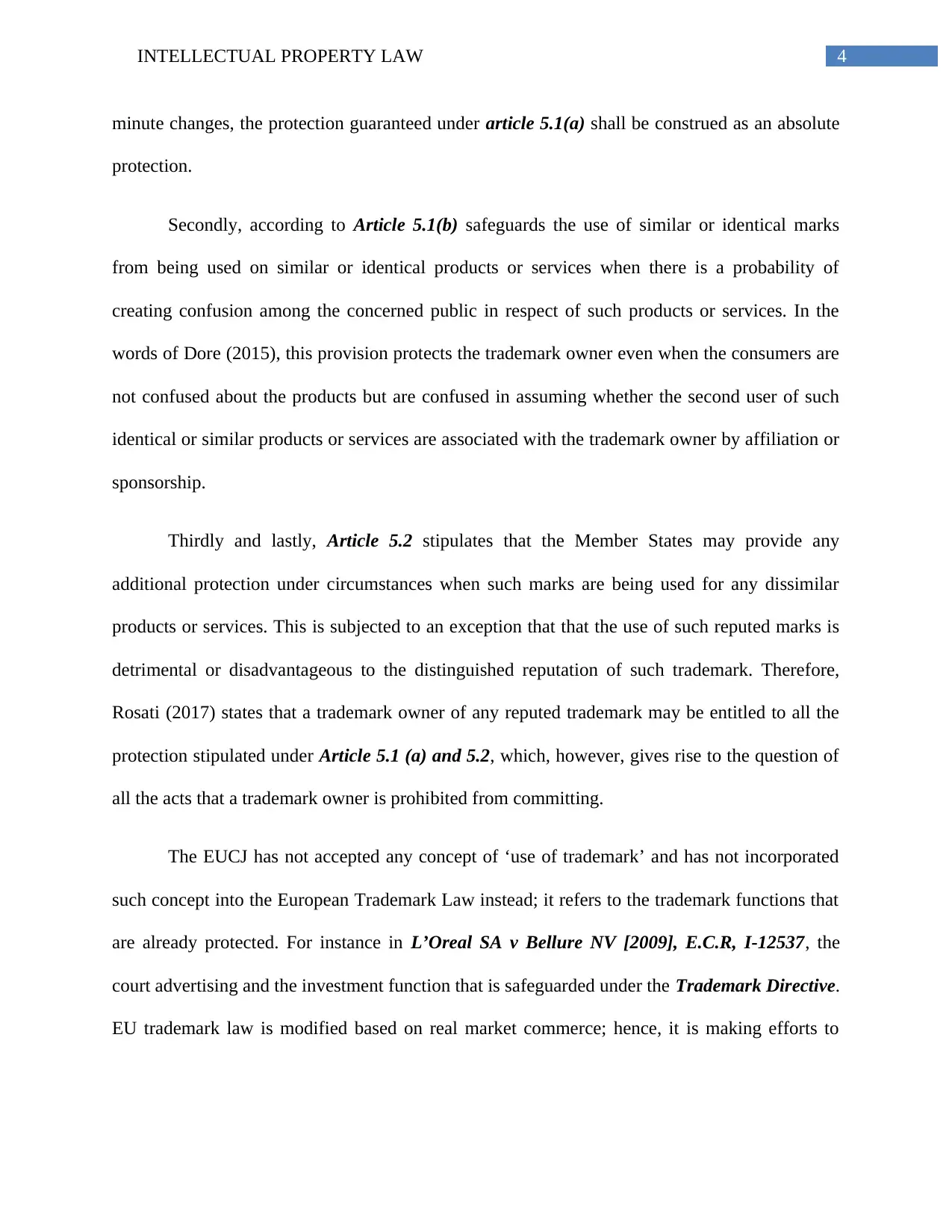
4INTELLECTUAL PROPERTY LAW
minute changes, the protection guaranteed under article 5.1(a) shall be construed as an absolute
protection.
Secondly, according to Article 5.1(b) safeguards the use of similar or identical marks
from being used on similar or identical products or services when there is a probability of
creating confusion among the concerned public in respect of such products or services. In the
words of Dore (2015), this provision protects the trademark owner even when the consumers are
not confused about the products but are confused in assuming whether the second user of such
identical or similar products or services are associated with the trademark owner by affiliation or
sponsorship.
Thirdly and lastly, Article 5.2 stipulates that the Member States may provide any
additional protection under circumstances when such marks are being used for any dissimilar
products or services. This is subjected to an exception that that the use of such reputed marks is
detrimental or disadvantageous to the distinguished reputation of such trademark. Therefore,
Rosati (2017) states that a trademark owner of any reputed trademark may be entitled to all the
protection stipulated under Article 5.1 (a) and 5.2, which, however, gives rise to the question of
all the acts that a trademark owner is prohibited from committing.
The EUCJ has not accepted any concept of ‘use of trademark’ and has not incorporated
such concept into the European Trademark Law instead; it refers to the trademark functions that
are already protected. For instance in L’Oreal SA v Bellure NV [2009], E.C.R, I-12537, the
court advertising and the investment function that is safeguarded under the Trademark Directive.
EU trademark law is modified based on real market commerce; hence, it is making efforts to
minute changes, the protection guaranteed under article 5.1(a) shall be construed as an absolute
protection.
Secondly, according to Article 5.1(b) safeguards the use of similar or identical marks
from being used on similar or identical products or services when there is a probability of
creating confusion among the concerned public in respect of such products or services. In the
words of Dore (2015), this provision protects the trademark owner even when the consumers are
not confused about the products but are confused in assuming whether the second user of such
identical or similar products or services are associated with the trademark owner by affiliation or
sponsorship.
Thirdly and lastly, Article 5.2 stipulates that the Member States may provide any
additional protection under circumstances when such marks are being used for any dissimilar
products or services. This is subjected to an exception that that the use of such reputed marks is
detrimental or disadvantageous to the distinguished reputation of such trademark. Therefore,
Rosati (2017) states that a trademark owner of any reputed trademark may be entitled to all the
protection stipulated under Article 5.1 (a) and 5.2, which, however, gives rise to the question of
all the acts that a trademark owner is prohibited from committing.
The EUCJ has not accepted any concept of ‘use of trademark’ and has not incorporated
such concept into the European Trademark Law instead; it refers to the trademark functions that
are already protected. For instance in L’Oreal SA v Bellure NV [2009], E.C.R, I-12537, the
court advertising and the investment function that is safeguarded under the Trademark Directive.
EU trademark law is modified based on real market commerce; hence, it is making efforts to
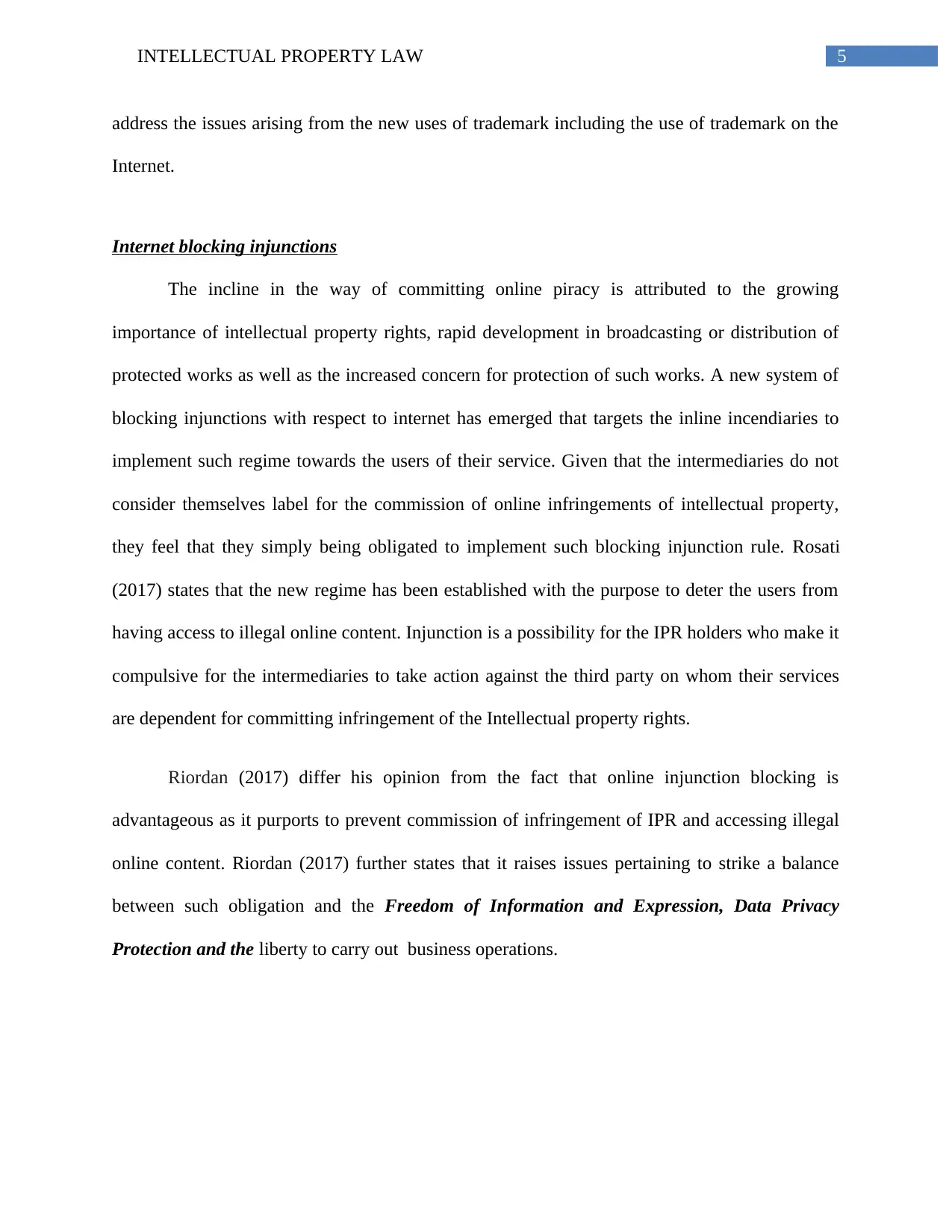
5INTELLECTUAL PROPERTY LAW
address the issues arising from the new uses of trademark including the use of trademark on the
Internet.
Internet blocking injunctions
The incline in the way of committing online piracy is attributed to the growing
importance of intellectual property rights, rapid development in broadcasting or distribution of
protected works as well as the increased concern for protection of such works. A new system of
blocking injunctions with respect to internet has emerged that targets the inline incendiaries to
implement such regime towards the users of their service. Given that the intermediaries do not
consider themselves label for the commission of online infringements of intellectual property,
they feel that they simply being obligated to implement such blocking injunction rule. Rosati
(2017) states that the new regime has been established with the purpose to deter the users from
having access to illegal online content. Injunction is a possibility for the IPR holders who make it
compulsive for the intermediaries to take action against the third party on whom their services
are dependent for committing infringement of the Intellectual property rights.
Riordan (2017) differ his opinion from the fact that online injunction blocking is
advantageous as it purports to prevent commission of infringement of IPR and accessing illegal
online content. Riordan (2017) further states that it raises issues pertaining to strike a balance
between such obligation and the Freedom of Information and Expression, Data Privacy
Protection and the liberty to carry out business operations.
address the issues arising from the new uses of trademark including the use of trademark on the
Internet.
Internet blocking injunctions
The incline in the way of committing online piracy is attributed to the growing
importance of intellectual property rights, rapid development in broadcasting or distribution of
protected works as well as the increased concern for protection of such works. A new system of
blocking injunctions with respect to internet has emerged that targets the inline incendiaries to
implement such regime towards the users of their service. Given that the intermediaries do not
consider themselves label for the commission of online infringements of intellectual property,
they feel that they simply being obligated to implement such blocking injunction rule. Rosati
(2017) states that the new regime has been established with the purpose to deter the users from
having access to illegal online content. Injunction is a possibility for the IPR holders who make it
compulsive for the intermediaries to take action against the third party on whom their services
are dependent for committing infringement of the Intellectual property rights.
Riordan (2017) differ his opinion from the fact that online injunction blocking is
advantageous as it purports to prevent commission of infringement of IPR and accessing illegal
online content. Riordan (2017) further states that it raises issues pertaining to strike a balance
between such obligation and the Freedom of Information and Expression, Data Privacy
Protection and the liberty to carry out business operations.
⊘ This is a preview!⊘
Do you want full access?
Subscribe today to unlock all pages.

Trusted by 1+ million students worldwide
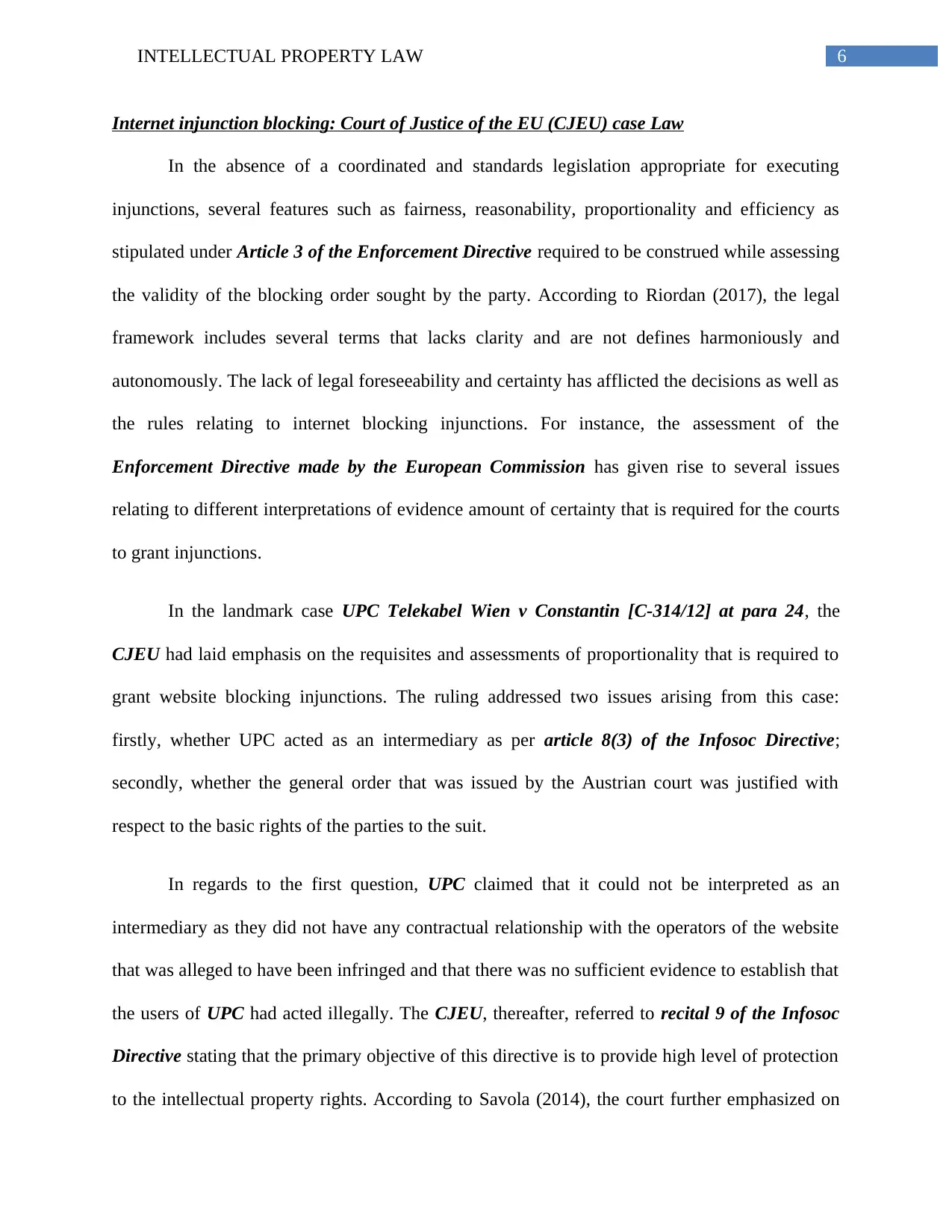
6INTELLECTUAL PROPERTY LAW
Internet injunction blocking: Court of Justice of the EU (CJEU) case Law
In the absence of a coordinated and standards legislation appropriate for executing
injunctions, several features such as fairness, reasonability, proportionality and efficiency as
stipulated under Article 3 of the Enforcement Directive required to be construed while assessing
the validity of the blocking order sought by the party. According to Riordan (2017), the legal
framework includes several terms that lacks clarity and are not defines harmoniously and
autonomously. The lack of legal foreseeability and certainty has afflicted the decisions as well as
the rules relating to internet blocking injunctions. For instance, the assessment of the
Enforcement Directive made by the European Commission has given rise to several issues
relating to different interpretations of evidence amount of certainty that is required for the courts
to grant injunctions.
In the landmark case UPC Telekabel Wien v Constantin [C-314/12] at para 24, the
CJEU had laid emphasis on the requisites and assessments of proportionality that is required to
grant website blocking injunctions. The ruling addressed two issues arising from this case:
firstly, whether UPC acted as an intermediary as per article 8(3) of the Infosoc Directive;
secondly, whether the general order that was issued by the Austrian court was justified with
respect to the basic rights of the parties to the suit.
In regards to the first question, UPC claimed that it could not be interpreted as an
intermediary as they did not have any contractual relationship with the operators of the website
that was alleged to have been infringed and that there was no sufficient evidence to establish that
the users of UPC had acted illegally. The CJEU, thereafter, referred to recital 9 of the Infosoc
Directive stating that the primary objective of this directive is to provide high level of protection
to the intellectual property rights. According to Savola (2014), the court further emphasized on
Internet injunction blocking: Court of Justice of the EU (CJEU) case Law
In the absence of a coordinated and standards legislation appropriate for executing
injunctions, several features such as fairness, reasonability, proportionality and efficiency as
stipulated under Article 3 of the Enforcement Directive required to be construed while assessing
the validity of the blocking order sought by the party. According to Riordan (2017), the legal
framework includes several terms that lacks clarity and are not defines harmoniously and
autonomously. The lack of legal foreseeability and certainty has afflicted the decisions as well as
the rules relating to internet blocking injunctions. For instance, the assessment of the
Enforcement Directive made by the European Commission has given rise to several issues
relating to different interpretations of evidence amount of certainty that is required for the courts
to grant injunctions.
In the landmark case UPC Telekabel Wien v Constantin [C-314/12] at para 24, the
CJEU had laid emphasis on the requisites and assessments of proportionality that is required to
grant website blocking injunctions. The ruling addressed two issues arising from this case:
firstly, whether UPC acted as an intermediary as per article 8(3) of the Infosoc Directive;
secondly, whether the general order that was issued by the Austrian court was justified with
respect to the basic rights of the parties to the suit.
In regards to the first question, UPC claimed that it could not be interpreted as an
intermediary as they did not have any contractual relationship with the operators of the website
that was alleged to have been infringed and that there was no sufficient evidence to establish that
the users of UPC had acted illegally. The CJEU, thereafter, referred to recital 9 of the Infosoc
Directive stating that the primary objective of this directive is to provide high level of protection
to the intellectual property rights. According to Savola (2014), the court further emphasized on
Paraphrase This Document
Need a fresh take? Get an instant paraphrase of this document with our AI Paraphraser
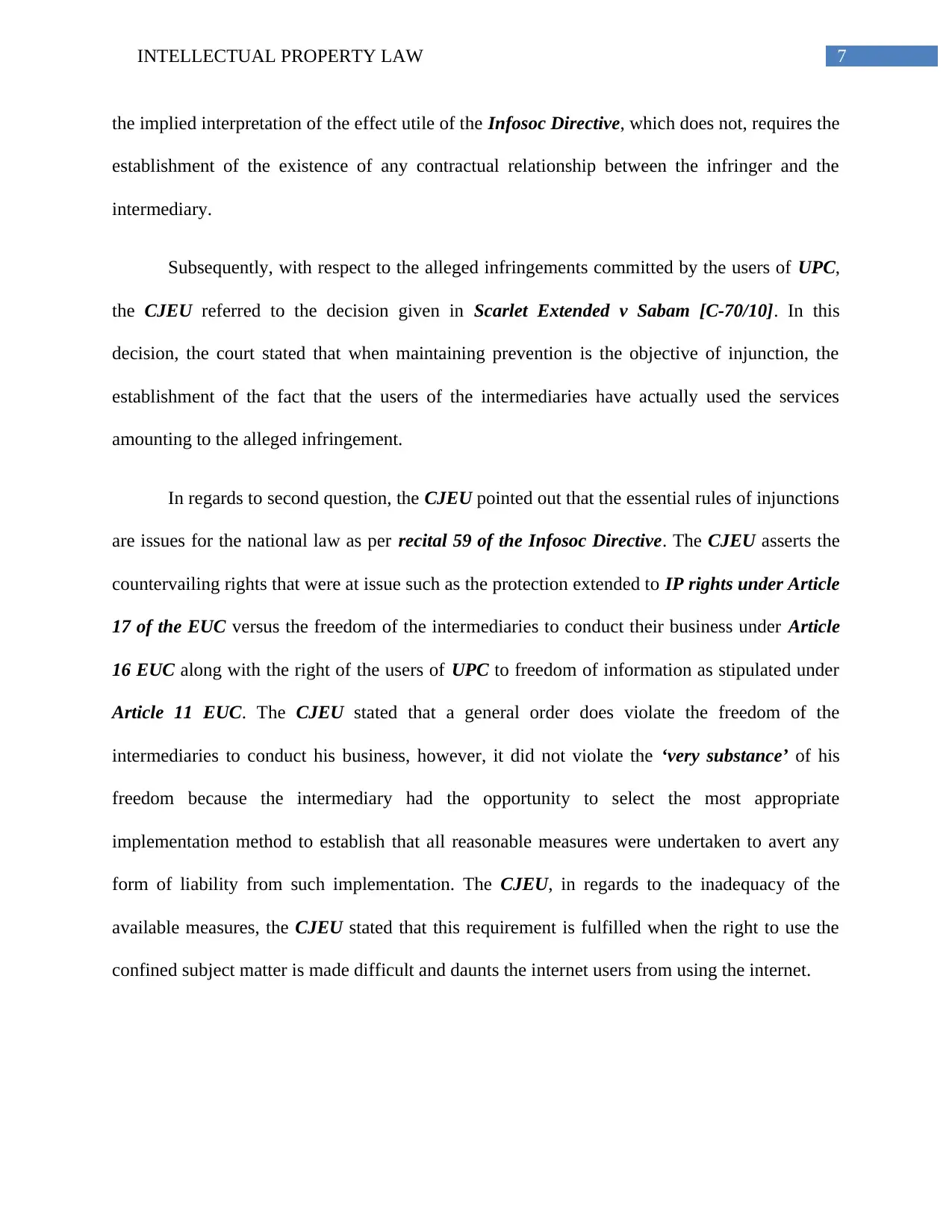
7INTELLECTUAL PROPERTY LAW
the implied interpretation of the effect utile of the Infosoc Directive, which does not, requires the
establishment of the existence of any contractual relationship between the infringer and the
intermediary.
Subsequently, with respect to the alleged infringements committed by the users of UPC,
the CJEU referred to the decision given in Scarlet Extended v Sabam [C-70/10]. In this
decision, the court stated that when maintaining prevention is the objective of injunction, the
establishment of the fact that the users of the intermediaries have actually used the services
amounting to the alleged infringement.
In regards to second question, the CJEU pointed out that the essential rules of injunctions
are issues for the national law as per recital 59 of the Infosoc Directive. The CJEU asserts the
countervailing rights that were at issue such as the protection extended to IP rights under Article
17 of the EUC versus the freedom of the intermediaries to conduct their business under Article
16 EUC along with the right of the users of UPC to freedom of information as stipulated under
Article 11 EUC. The CJEU stated that a general order does violate the freedom of the
intermediaries to conduct his business, however, it did not violate the ‘very substance’ of his
freedom because the intermediary had the opportunity to select the most appropriate
implementation method to establish that all reasonable measures were undertaken to avert any
form of liability from such implementation. The CJEU, in regards to the inadequacy of the
available measures, the CJEU stated that this requirement is fulfilled when the right to use the
confined subject matter is made difficult and daunts the internet users from using the internet.
the implied interpretation of the effect utile of the Infosoc Directive, which does not, requires the
establishment of the existence of any contractual relationship between the infringer and the
intermediary.
Subsequently, with respect to the alleged infringements committed by the users of UPC,
the CJEU referred to the decision given in Scarlet Extended v Sabam [C-70/10]. In this
decision, the court stated that when maintaining prevention is the objective of injunction, the
establishment of the fact that the users of the intermediaries have actually used the services
amounting to the alleged infringement.
In regards to second question, the CJEU pointed out that the essential rules of injunctions
are issues for the national law as per recital 59 of the Infosoc Directive. The CJEU asserts the
countervailing rights that were at issue such as the protection extended to IP rights under Article
17 of the EUC versus the freedom of the intermediaries to conduct their business under Article
16 EUC along with the right of the users of UPC to freedom of information as stipulated under
Article 11 EUC. The CJEU stated that a general order does violate the freedom of the
intermediaries to conduct his business, however, it did not violate the ‘very substance’ of his
freedom because the intermediary had the opportunity to select the most appropriate
implementation method to establish that all reasonable measures were undertaken to avert any
form of liability from such implementation. The CJEU, in regards to the inadequacy of the
available measures, the CJEU stated that this requirement is fulfilled when the right to use the
confined subject matter is made difficult and daunts the internet users from using the internet.
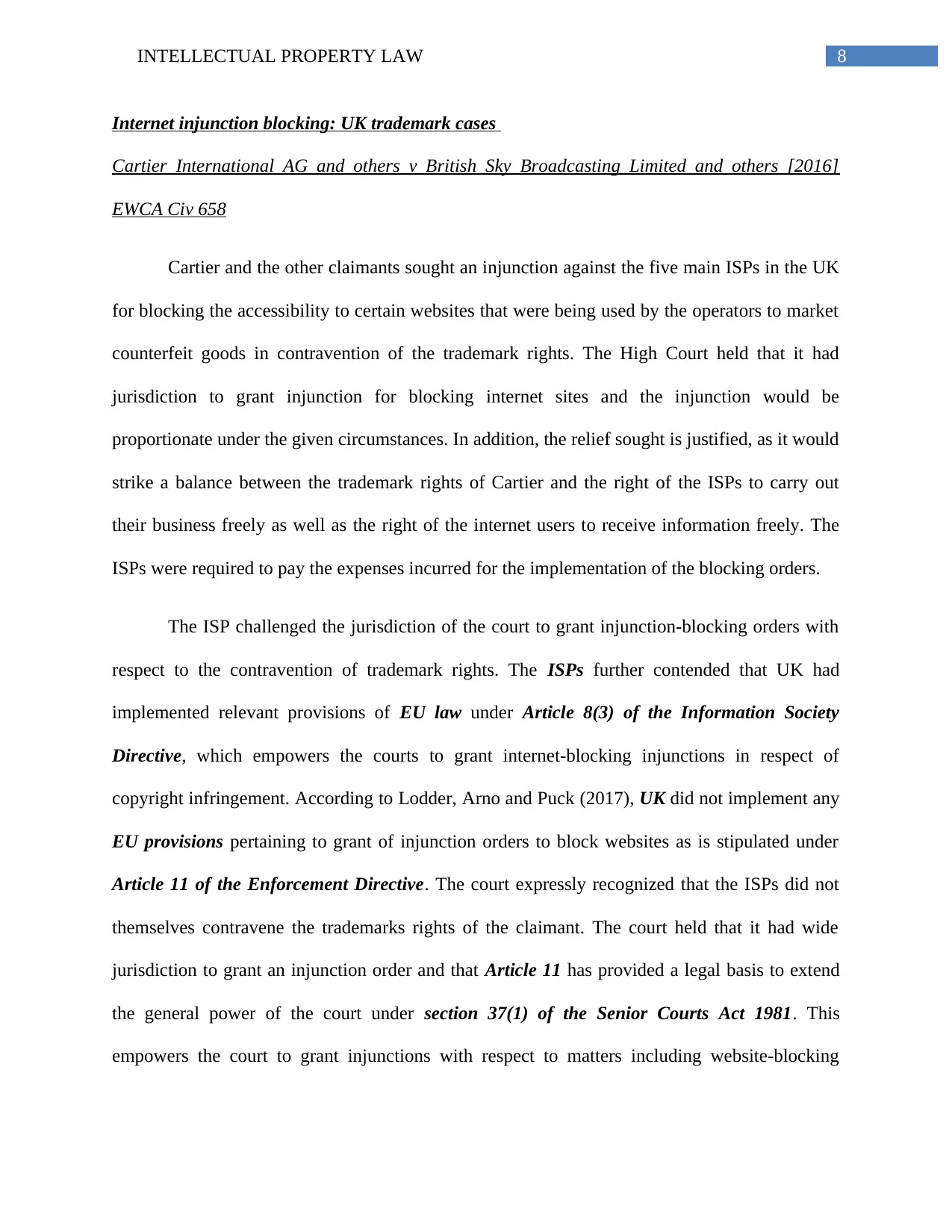
8INTELLECTUAL PROPERTY LAW
Internet injunction blocking: UK trademark cases
Cartier International AG and others v British Sky Broadcasting Limited and others [2016]
EWCA Civ 658
Cartier and the other claimants sought an injunction against the five main ISPs in the UK
for blocking the accessibility to certain websites that were being used by the operators to market
counterfeit goods in contravention of the trademark rights. The High Court held that it had
jurisdiction to grant injunction for blocking internet sites and the injunction would be
proportionate under the given circumstances. In addition, the relief sought is justified, as it would
strike a balance between the trademark rights of Cartier and the right of the ISPs to carry out
their business freely as well as the right of the internet users to receive information freely. The
ISPs were required to pay the expenses incurred for the implementation of the blocking orders.
The ISP challenged the jurisdiction of the court to grant injunction-blocking orders with
respect to the contravention of trademark rights. The ISPs further contended that UK had
implemented relevant provisions of EU law under Article 8(3) of the Information Society
Directive, which empowers the courts to grant internet-blocking injunctions in respect of
copyright infringement. According to Lodder, Arno and Puck (2017), UK did not implement any
EU provisions pertaining to grant of injunction orders to block websites as is stipulated under
Article 11 of the Enforcement Directive. The court expressly recognized that the ISPs did not
themselves contravene the trademarks rights of the claimant. The court held that it had wide
jurisdiction to grant an injunction order and that Article 11 has provided a legal basis to extend
the general power of the court under section 37(1) of the Senior Courts Act 1981. This
empowers the court to grant injunctions with respect to matters including website-blocking
Internet injunction blocking: UK trademark cases
Cartier International AG and others v British Sky Broadcasting Limited and others [2016]
EWCA Civ 658
Cartier and the other claimants sought an injunction against the five main ISPs in the UK
for blocking the accessibility to certain websites that were being used by the operators to market
counterfeit goods in contravention of the trademark rights. The High Court held that it had
jurisdiction to grant injunction for blocking internet sites and the injunction would be
proportionate under the given circumstances. In addition, the relief sought is justified, as it would
strike a balance between the trademark rights of Cartier and the right of the ISPs to carry out
their business freely as well as the right of the internet users to receive information freely. The
ISPs were required to pay the expenses incurred for the implementation of the blocking orders.
The ISP challenged the jurisdiction of the court to grant injunction-blocking orders with
respect to the contravention of trademark rights. The ISPs further contended that UK had
implemented relevant provisions of EU law under Article 8(3) of the Information Society
Directive, which empowers the courts to grant internet-blocking injunctions in respect of
copyright infringement. According to Lodder, Arno and Puck (2017), UK did not implement any
EU provisions pertaining to grant of injunction orders to block websites as is stipulated under
Article 11 of the Enforcement Directive. The court expressly recognized that the ISPs did not
themselves contravene the trademarks rights of the claimant. The court held that it had wide
jurisdiction to grant an injunction order and that Article 11 has provided a legal basis to extend
the general power of the court under section 37(1) of the Senior Courts Act 1981. This
empowers the court to grant injunctions with respect to matters including website-blocking
⊘ This is a preview!⊘
Do you want full access?
Subscribe today to unlock all pages.

Trusted by 1+ million students worldwide
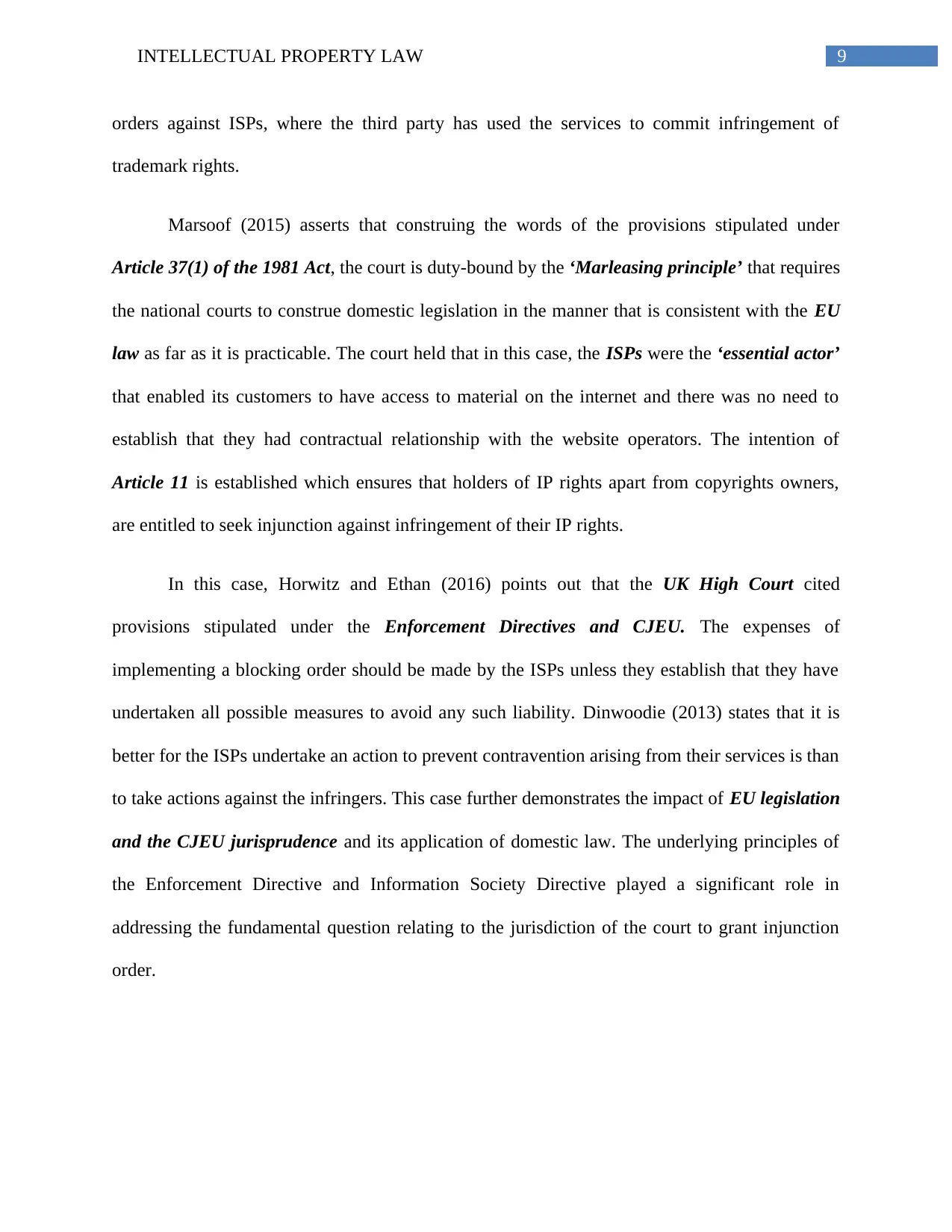
9INTELLECTUAL PROPERTY LAW
orders against ISPs, where the third party has used the services to commit infringement of
trademark rights.
Marsoof (2015) asserts that construing the words of the provisions stipulated under
Article 37(1) of the 1981 Act, the court is duty-bound by the ‘Marleasing principle’ that requires
the national courts to construe domestic legislation in the manner that is consistent with the EU
law as far as it is practicable. The court held that in this case, the ISPs were the ‘essential actor’
that enabled its customers to have access to material on the internet and there was no need to
establish that they had contractual relationship with the website operators. The intention of
Article 11 is established which ensures that holders of IP rights apart from copyrights owners,
are entitled to seek injunction against infringement of their IP rights.
In this case, Horwitz and Ethan (2016) points out that the UK High Court cited
provisions stipulated under the Enforcement Directives and CJEU. The expenses of
implementing a blocking order should be made by the ISPs unless they establish that they have
undertaken all possible measures to avoid any such liability. Dinwoodie (2013) states that it is
better for the ISPs undertake an action to prevent contravention arising from their services is than
to take actions against the infringers. This case further demonstrates the impact of EU legislation
and the CJEU jurisprudence and its application of domestic law. The underlying principles of
the Enforcement Directive and Information Society Directive played a significant role in
addressing the fundamental question relating to the jurisdiction of the court to grant injunction
order.
orders against ISPs, where the third party has used the services to commit infringement of
trademark rights.
Marsoof (2015) asserts that construing the words of the provisions stipulated under
Article 37(1) of the 1981 Act, the court is duty-bound by the ‘Marleasing principle’ that requires
the national courts to construe domestic legislation in the manner that is consistent with the EU
law as far as it is practicable. The court held that in this case, the ISPs were the ‘essential actor’
that enabled its customers to have access to material on the internet and there was no need to
establish that they had contractual relationship with the website operators. The intention of
Article 11 is established which ensures that holders of IP rights apart from copyrights owners,
are entitled to seek injunction against infringement of their IP rights.
In this case, Horwitz and Ethan (2016) points out that the UK High Court cited
provisions stipulated under the Enforcement Directives and CJEU. The expenses of
implementing a blocking order should be made by the ISPs unless they establish that they have
undertaken all possible measures to avoid any such liability. Dinwoodie (2013) states that it is
better for the ISPs undertake an action to prevent contravention arising from their services is than
to take actions against the infringers. This case further demonstrates the impact of EU legislation
and the CJEU jurisprudence and its application of domestic law. The underlying principles of
the Enforcement Directive and Information Society Directive played a significant role in
addressing the fundamental question relating to the jurisdiction of the court to grant injunction
order.
Paraphrase This Document
Need a fresh take? Get an instant paraphrase of this document with our AI Paraphraser
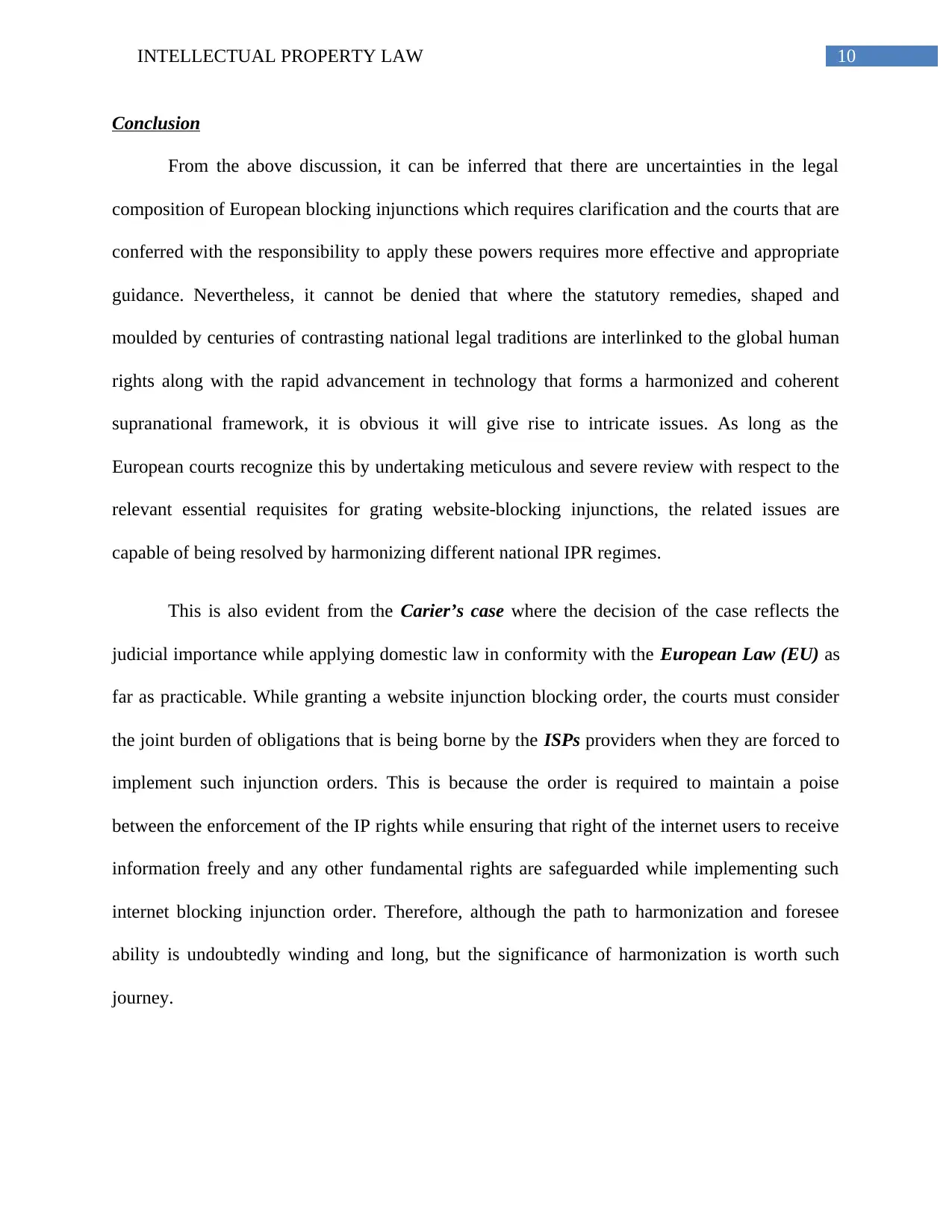
10INTELLECTUAL PROPERTY LAW
Conclusion
From the above discussion, it can be inferred that there are uncertainties in the legal
composition of European blocking injunctions which requires clarification and the courts that are
conferred with the responsibility to apply these powers requires more effective and appropriate
guidance. Nevertheless, it cannot be denied that where the statutory remedies, shaped and
moulded by centuries of contrasting national legal traditions are interlinked to the global human
rights along with the rapid advancement in technology that forms a harmonized and coherent
supranational framework, it is obvious it will give rise to intricate issues. As long as the
European courts recognize this by undertaking meticulous and severe review with respect to the
relevant essential requisites for grating website-blocking injunctions, the related issues are
capable of being resolved by harmonizing different national IPR regimes.
This is also evident from the Carier’s case where the decision of the case reflects the
judicial importance while applying domestic law in conformity with the European Law (EU) as
far as practicable. While granting a website injunction blocking order, the courts must consider
the joint burden of obligations that is being borne by the ISPs providers when they are forced to
implement such injunction orders. This is because the order is required to maintain a poise
between the enforcement of the IP rights while ensuring that right of the internet users to receive
information freely and any other fundamental rights are safeguarded while implementing such
internet blocking injunction order. Therefore, although the path to harmonization and foresee
ability is undoubtedly winding and long, but the significance of harmonization is worth such
journey.
Conclusion
From the above discussion, it can be inferred that there are uncertainties in the legal
composition of European blocking injunctions which requires clarification and the courts that are
conferred with the responsibility to apply these powers requires more effective and appropriate
guidance. Nevertheless, it cannot be denied that where the statutory remedies, shaped and
moulded by centuries of contrasting national legal traditions are interlinked to the global human
rights along with the rapid advancement in technology that forms a harmonized and coherent
supranational framework, it is obvious it will give rise to intricate issues. As long as the
European courts recognize this by undertaking meticulous and severe review with respect to the
relevant essential requisites for grating website-blocking injunctions, the related issues are
capable of being resolved by harmonizing different national IPR regimes.
This is also evident from the Carier’s case where the decision of the case reflects the
judicial importance while applying domestic law in conformity with the European Law (EU) as
far as practicable. While granting a website injunction blocking order, the courts must consider
the joint burden of obligations that is being borne by the ISPs providers when they are forced to
implement such injunction orders. This is because the order is required to maintain a poise
between the enforcement of the IP rights while ensuring that right of the internet users to receive
information freely and any other fundamental rights are safeguarded while implementing such
internet blocking injunction order. Therefore, although the path to harmonization and foresee
ability is undoubtedly winding and long, but the significance of harmonization is worth such
journey.
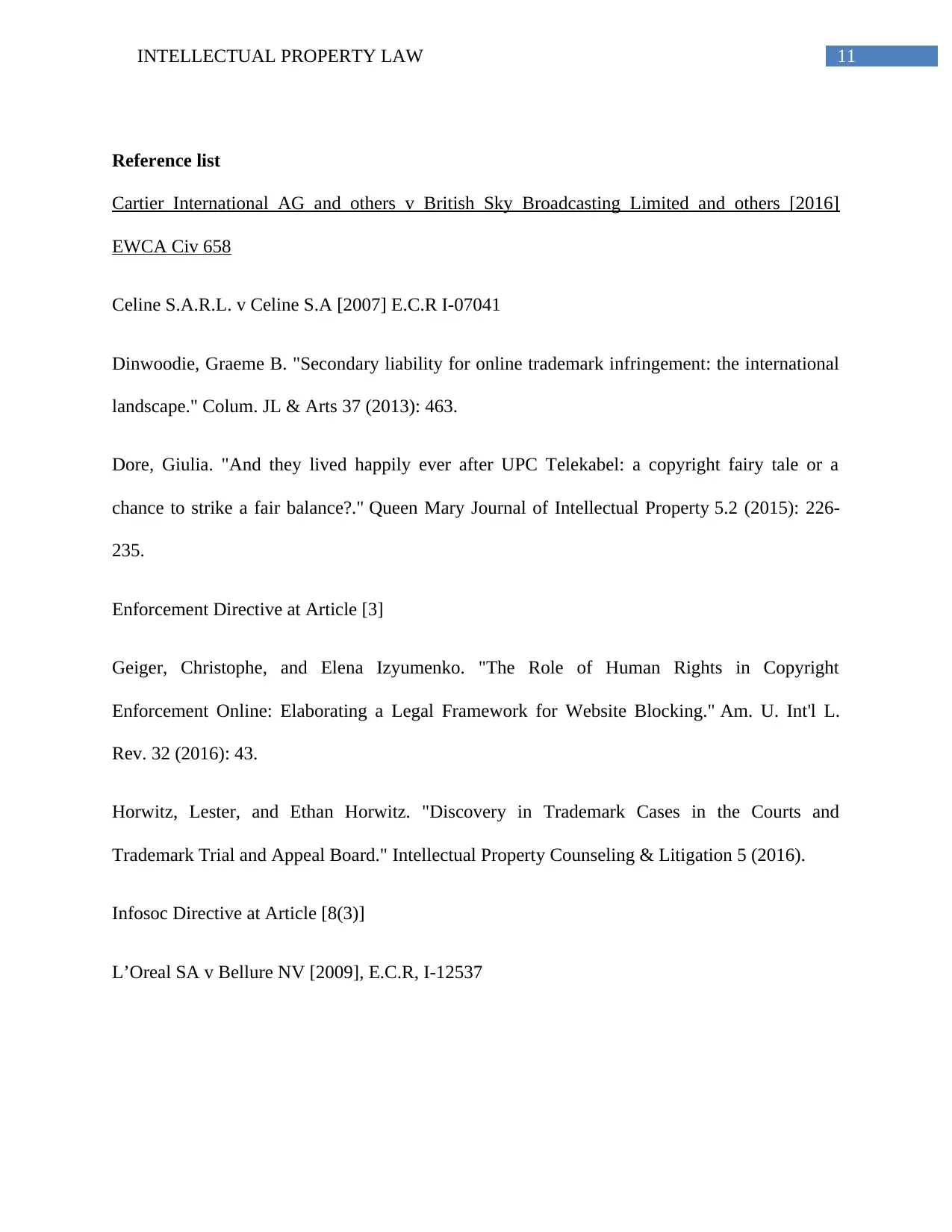
11INTELLECTUAL PROPERTY LAW
Reference list
Cartier International AG and others v British Sky Broadcasting Limited and others [2016]
EWCA Civ 658
Celine S.A.R.L. v Celine S.A [2007] E.C.R I-07041
Dinwoodie, Graeme B. "Secondary liability for online trademark infringement: the international
landscape." Colum. JL & Arts 37 (2013): 463.
Dore, Giulia. "And they lived happily ever after UPC Telekabel: a copyright fairy tale or a
chance to strike a fair balance?." Queen Mary Journal of Intellectual Property 5.2 (2015): 226-
235.
Enforcement Directive at Article [3]
Geiger, Christophe, and Elena Izyumenko. "The Role of Human Rights in Copyright
Enforcement Online: Elaborating a Legal Framework for Website Blocking." Am. U. Int'l L.
Rev. 32 (2016): 43.
Horwitz, Lester, and Ethan Horwitz. "Discovery in Trademark Cases in the Courts and
Trademark Trial and Appeal Board." Intellectual Property Counseling & Litigation 5 (2016).
Infosoc Directive at Article [8(3)]
L’Oreal SA v Bellure NV [2009], E.C.R, I-12537
Reference list
Cartier International AG and others v British Sky Broadcasting Limited and others [2016]
EWCA Civ 658
Celine S.A.R.L. v Celine S.A [2007] E.C.R I-07041
Dinwoodie, Graeme B. "Secondary liability for online trademark infringement: the international
landscape." Colum. JL & Arts 37 (2013): 463.
Dore, Giulia. "And they lived happily ever after UPC Telekabel: a copyright fairy tale or a
chance to strike a fair balance?." Queen Mary Journal of Intellectual Property 5.2 (2015): 226-
235.
Enforcement Directive at Article [3]
Geiger, Christophe, and Elena Izyumenko. "The Role of Human Rights in Copyright
Enforcement Online: Elaborating a Legal Framework for Website Blocking." Am. U. Int'l L.
Rev. 32 (2016): 43.
Horwitz, Lester, and Ethan Horwitz. "Discovery in Trademark Cases in the Courts and
Trademark Trial and Appeal Board." Intellectual Property Counseling & Litigation 5 (2016).
Infosoc Directive at Article [8(3)]
L’Oreal SA v Bellure NV [2009], E.C.R, I-12537
⊘ This is a preview!⊘
Do you want full access?
Subscribe today to unlock all pages.

Trusted by 1+ million students worldwide
1 out of 14
Related Documents
Your All-in-One AI-Powered Toolkit for Academic Success.
+13062052269
info@desklib.com
Available 24*7 on WhatsApp / Email
![[object Object]](/_next/static/media/star-bottom.7253800d.svg)
Unlock your academic potential
Copyright © 2020–2026 A2Z Services. All Rights Reserved. Developed and managed by ZUCOL.



